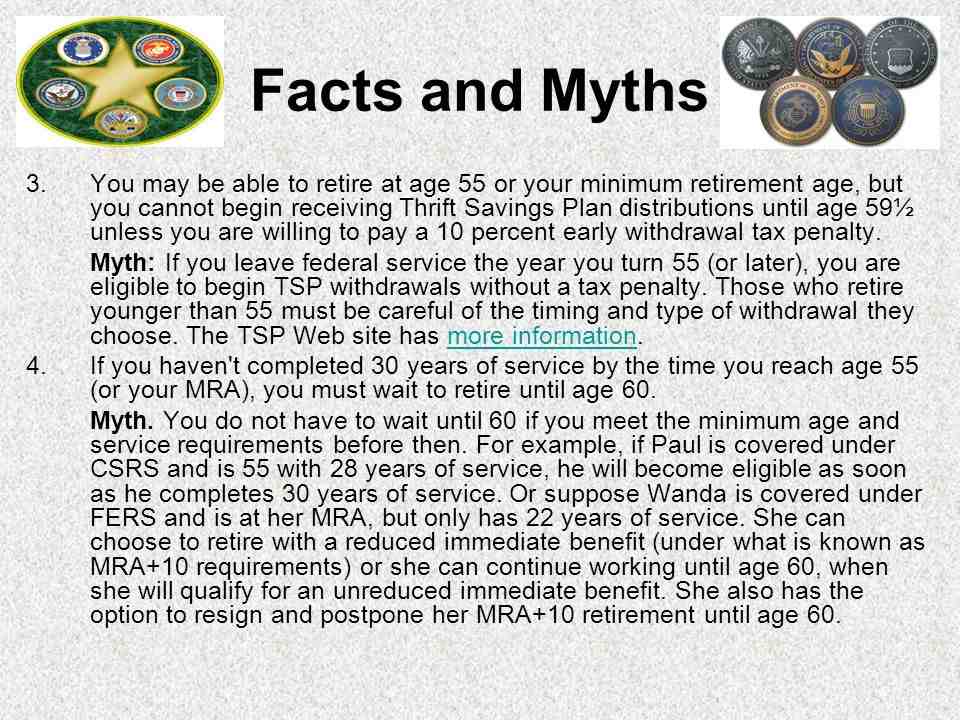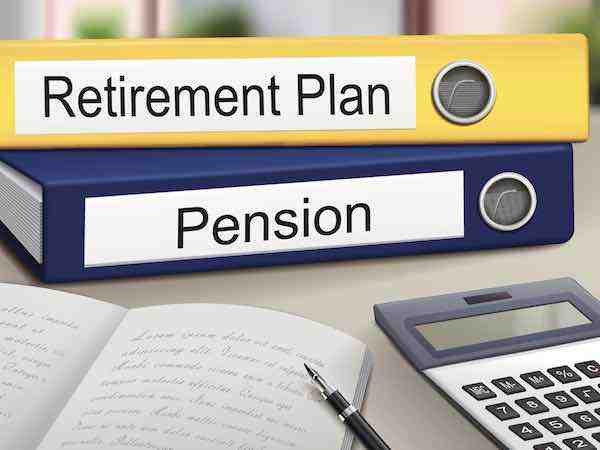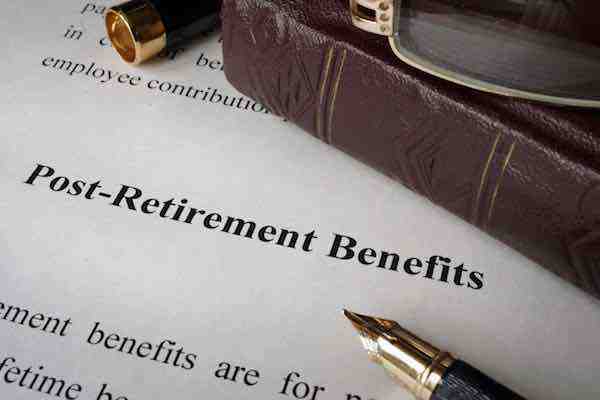To vest (eligible to receive your retirement benefits from the Basic Benefit Plan if you leave federal service before you retire), you must have at least 5 years of meritorious civilian service. After 18 months of civilian service, survivorship and disability benefits are available.
How early can I retire under FERS?

Under FERS, an employee who meets one of the following age and service requirements is entitled to an immediate retirement benefit: age 62 at five years of service, age 60 at age 20, Minimum Retirement Age (MRA) at 30 or MRA at 10 (but with reduced benefit) .
Can a FERS employee retire early? It is possible to retire early with only 10 years of service. … One is a unique option under the Federal Employees Retirement System that allows an employee with only 10 years of service to retire at minimum retirement age.
What is the earliest I can retire under FERS?
MRAs range between 55 and 57, depending on your year of birth. The same is true if you retire under a VERA, but only when you reach your MRA. … The SRS remains for 62 years, when you first become eligible for Social Security benefits.
Can I retire after 5 years of federal service?
To vest (eligible to receive your retirement benefits from the Basic Benefit Plan if you leave federal service before you retire), you must have at least 5 years of meritorious civilian service.
Do federal pensions expire?
Only federal employees hired before 1984 participate in the Civil Service Retirement System (CSRS). The CSRS is closed to new entrants and will expire with the death of the last CSRS annuitant sometime around the year 2075.
What is the Average Retirement for a Federal Employee? What is the Average Retirement for a Federal Employee? Median Retirement Benefit The median private retirement benefit for individuals age 65 and older was $9,827 per year. The median state or local government retirement benefit was $22,546 per year.
Does a federal pension run out?
While it’s virtually impossible for a federal or postal retiree to run out of money, it’s possible to get dangerously low — even with an annuity indexed in whole or in part to inflation. … And retired FBI has not run out of money. Even with COLAs, and especially the diet COLA, they can be short on money.
How long does a federal pension last?
After retirement you are entitled to a monthly annuity for life. If you leave federal service before reaching full retirement age and have a minimum of 5 years of FERS service, you may choose to retire on a deferred basis.
Do pensions last for life?
Retirement benefits are made for the rest of your life, regardless of how long you live, and may be continued with your spouse after death. … It is not uncommon for people to take a lump sum to survive payment, while pension payments continue until death.
What happens to my federal life insurance when I turn 65?
*At age 65, premiums stop and the value of this coverage drops 2 percent per month for 50 months, after which coverage ends unless the retiree chooses to keep the full amount of insurance in effect and premiums continue Pay.
Do you keep life insurance when you retire from federal government?
Can I keep my basic insurance after my retirement? Yes, you can keep your existing basic life insurance policy if you meet all of the following conditions: You are enrolled in basic life insurance policy under the Federal Employees’ Group Life Insurance (FEGLI) program when you retire.
How does federal life insurance work after retirement?
Effective at the end of the month following the month in which you turn 65 or retire (if later), your Option A coverage will be reduced by 2 percent of the pre-retirement amount per month to 25% of the pre-retirement amount ($ 2,500.00). Coverage is free after you turn 65 or retire (if later).
Is FERS pension for life?
FERS is a retirement plan that offers benefits from three different sources: a Basic Benefit Plan, Social Security, and the Thrift Savings Plan (TSP). … After you retire, you will receive a monthly annuity payment for the rest of your life.
Is FERS pension fully funded?
FERS annuities are funded entirely by the sum of employee and employer contributions and interest earned by the Treasury bonds held by the Civil Service Retirement and Disability Fund (CSRDF).
What is the average FERS pension?
FERS benefits are smaller — averaging about $1,600 per month and a median of about $1,300, for annual rates of $19,200 and $15,600 — because that program also includes Social Security as a basic element.
How do pensions pay out?

Pensions
- take a retirement annuity and receive a monthly check; or, if your employer allows it,
- take a lump sum, which you will have to invest and manage: lump sums can be rolled into an IRA, where you are only taxed on money you decide to take out.
How long does it take before your pension is paid out? It typically takes between 4 and 12 weeks to process a pension fund payout (21 business days with 10X Investments), from the time your last contribution is invested or the required instruction forms are received by the manager (whichever comes later) is).
What is the average pension payout?
For those who do retire with a retirement plan, the average annual retirement benefit is $9,262 for a private pension, $22,172 for a federal government pension, and $24,592 for a railroad pension.
How much is a normal pension?
The full basic state pension is £137.60 per week. You can get more AOW if: you qualify for Supplementary AOW.
What is the average pension lump sum?
After a lifetime of saving, the average pension pot in the UK stands at £61,897. [3] At current annuity rates, this would give you an average retirement income of only around £3,000 extra per year from age 67, which when added to the maximum state pension, adds up to just over £12,000 per year, just enough for a basic retirement lifestyle.
How are pensions usually paid out?
Your traditional retirement plan is designed to provide you with a steady stream of income once you retire. That’s why your retirement benefits are normally paid in the form of lifetime monthly payments. Employers are increasingly making a one-off payment available to their employees for (part of) their pension.
How is a pension paid out?
pensions. … take an annuity and receive a monthly check; or, if your employer allows it, take a lump sum payment, which you must invest and manage: lump sums can be rolled into an IRA, where you are only taxed on money you decide to take out.
How are pensions paid out to beneficiaries?
With a defined contribution plan, such as a 401(k), the beneficiary can access the remaining funds in the retirement account through a gradual withdrawal, lump sum payment, or through the purchase of an annuity.
How do workplace pensions pay out?
In most schemes you can deduct 25 percent of your pension pot tax-free. You then have 6 months to withdraw the remaining 75 percent – you can usually: get regular payments (an ‘annuity’) invest the money in a fund that allows you to withdraw money (‘withdrawal’)
What happens to my pension contributions when I leave a job?
What happens to my pension if I change jobs? If you leave your employer, you will not lose the pension benefit you have accrued and the pension fund will be yours. … With most new forms of company pension, you can continue to contribute to this after you no longer work for the contributing employer.
How do I withdraw from my workplace pension?
All you need to do is contact your employer pension providers and ask for a withdrawal. If you have a small pot pension, you can withdraw all the money in cash. It normally takes about five weeks for the payments to come in, so you need to request the money in advance.
Do I get FERS back if I quit?

If you leave your federal job and want a refund of your retirement contributions, you can get an application from your personnel office, complete it, and return it to them.
What is a FERS refund? A FERS refund is a lump sum payment to a former employee or to an employee no longer covered by FERS of the amount of his or her lump sum credit.
How do I get my money back from FERS?
You can request a refund at any time after the divorce. Refund of Pension Deductions – Complete an Application for Refund (SF-3106). If you submit the form within 30 days of divorce, return it to the Benefits Office. After 30 days, forward it to OPM at the address on the form.
What happens to FERS when you quit?
Since FERS employees are covered by Social Security, when they apply for Social Security benefits, those years are counted against the years they earned through outside employment. In that regard, nothing is lost by leaving the government.
How do I claim my FERS retirement?
Use Form SF 3107, FERS Immediate Retirement Application, to apply for Immediate Retirement. You can request the form from your employment agency. Submit the completed application to your employment agency. Give your agency at least 60 days notice of your retirement date.
What happens to my FERS if I quit?
Since FERS employees are covered by Social Security, when they apply for Social Security benefits, those years are counted against the years they earned through outside employment. In that regard, nothing is lost by leaving the government.
Can you get out of FERS?
Can an employee opt out of FERS contributions? If the position is subject to FERS or CSRS deductions, deductions are mandatory. You cannot unsubscribe.
How long does it take to cash out FERS?
It can take up to eight weeks to process a revocation after all correctly completed revocation forms and divorce details have been received by the TSP Service Bureau.
Can you cash out your FERS retirement?
Federal employees who leave federal service have the option to withdraw their retirement contributions or wait until retirement age to claim a retirement annuity, usually at age 60 or 62, depending on years of service.
How long does it take to cash out FERS?
It can take up to eight weeks to process a revocation after all correctly completed revocation forms and divorce details have been received by the TSP Service Bureau.
How is FERS retirement paid out?
FERS is a retirement plan that offers benefits from three different sources: a Basic Benefit Plan, Social Security, and the Thrift Savings Plan (TSP). … After you retire, you will receive a monthly annuity payment for the rest of your life.
What happens if you have a break in federal service?

Federal employees who separate from duty receive a flat-rate allowance for their unused annual leave. An employee who has a service interruption and returns to work for the federal government is entitled to a refund of his or her sick leave, regardless of the length of the interruption.
What happens if you resign from federal service? The federal government has a generous leave policy. … So if you leave the federal government, you can have your annual vacation paid out. If you have 16 hours of vacation when you stop, you will receive two days’ wages added to your final salary. This is treated the same whether you quit or retire.
How does a break in service affect federal retirement?
If your service interruption lasted more than 365 days, you should be covered by social security on your return. You won’t be able to stay in the “ordinary old CSRSâ€; you will rather have to choose between CSRS Offset and FERS.
Can a federal employee lose their retirement?
It is very difficult for a federal employee to lose a pension after qualifying for retirement. Even if a former federal employee who meets the retirement requirements is convicted of a felony, the pension is still guaranteed in most cases.
Does my military service count toward federal retirement?
As a general rule, military service in the United States Armed Forces qualifies for federal retirement purposes if such active service has been terminated under honorable conditions and performed prior to separation from civilian service for retirement.
How long can you have a break in federal service?
Your Service Automatic (1%) and, if you qualify, Service Matching Contributions will also begin immediately. If you rejoin the uniformed services after a break of more than 30 days and you were not a BRS member before your break, you will not be automatically registered.
What is a break in service?
Interruption of employment is a period in which an employee with variable hours does not work during his standard or initial measurement period.
What is considered a break in federal service?
INTERRUPTION —The moment at which an employee is no longer on the payroll of an employment agency. … Usually it involves a shift from a position for which one personnel office provides service and maintains records to a position for which another personnel office in the same office provides service and maintains records.
Is LWOP considered a break in service?
LWOP equals temporary default status. The Employment and Reinstatement of Uniformed Services Act of 1994 (Public Law 103-353) also entitles employees to LWOP when employment with an employer is interrupted by a period of service in the uniformed service.
How many hours are federal employees allowed to leave?
Under the current statute, most federal employees can take up to 240 hours or 30 days of leave, although some can accrue more. Employees usually have to forfeit the accrued leave above the legal limit.
What happens if you leave federal service?
Leave. Annual leave: You will receive a lump sum for unused leave. It will follow the same electronic deposit as your paycheck. Sick leave: When you return to the federal government, the accrued sick leave will be credited back to your account.

